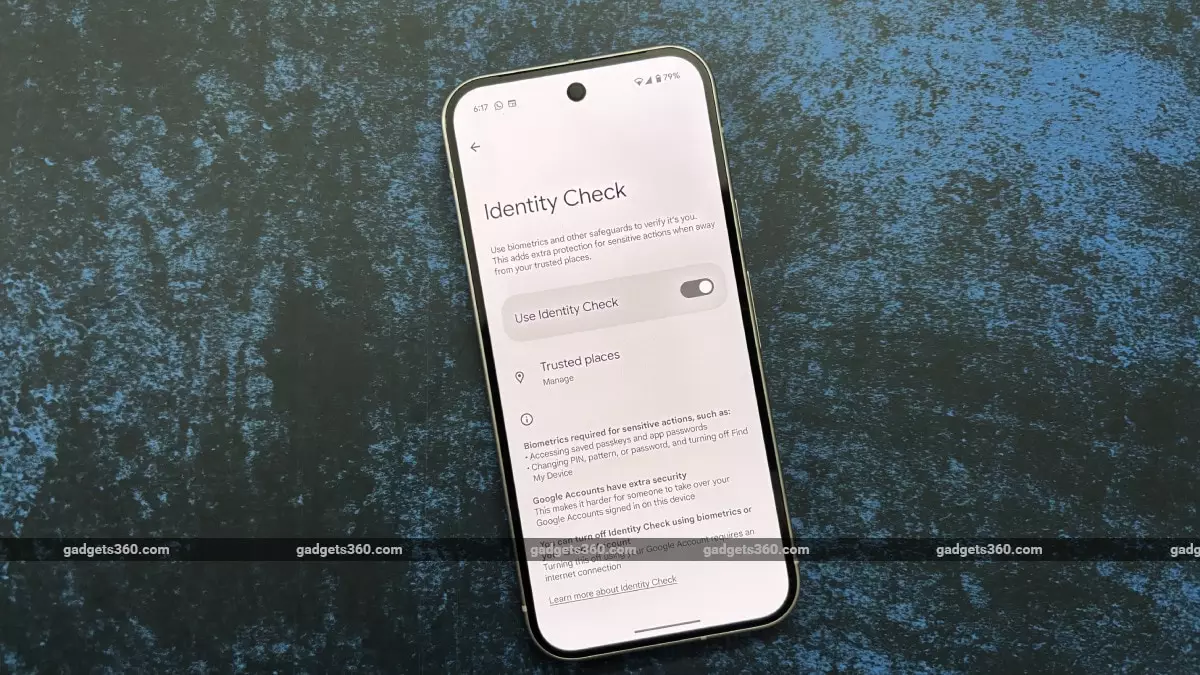In the age of rampant cyber threats and increasing incidents of device theft, the announcement of Google’s Identity Check feature signifies a pivotal moment for mobile security. Many users often underestimate the vulnerability of their devices, assuming that a simple passcode is enough to secure their data. However, as smartphones become more integrated into our daily lives—holding sensitive information, financial data, and personal communications—the need for robust security measures cannot be overstated. Google’s initiative to roll out Identity Check across various devices is not just timely; it’s essential.
The Identity Check feature, which requires biometric authentication for critical changes to device settings, serves as a formidable barrier against unauthorized access. This progression from traditional password-based security to biometric measures demonstrates a shift towards a more user-centric approach to protection. Biometric data, based on unique physical traits, presents a far more secure method of verifying identity than any code, no matter how complex. This is vital in a digital landscape where hackers constantly evolve their strategies.
Comparison with Apple’s Stolen Device Protection
While Google’s adoption of biometric security is commendable, it is imperative to recognize that Apple had been pioneering similar features before this. The introduction of ‘Stolen Device Protection’ with iOS 17.3 reflects a growing acknowledgment in the tech industry regarding the importance of safeguarding personal information. However, it is crucial to evaluate whether Apple’s initiatives are entirely effective. Even the most sophisticated security measures can be compromised, as evidenced by multiple high-profile breaches over the years.
Yet, instead of focusing on the competition between tech giants, the real takeaway from these developments should be a unified approach towards enhancing user security. As companies like Google and Apple introduce features that demand biometric verification for sensitive actions, the hope is that this trend will become standard across the industry, urging all manufacturers to prioritize the security of their users. This collective effort could lead to a branding shift where security becomes a defining characteristic of smartphones, rather than just an auxiliary feature.
Ensuring Accessibility and Reliability
Implementing features like Identity Check is just the initial step towards elevating user security; ensuring accessibility plays a crucial role as well. The requirement for a class 3 biometric authentication system restricts the feature’s availability to more advanced devices, potentially leaving those with older models vulnerable. In a world where technology often perpetuates inequalities, it is disheartening to see security protocols follow a similar trajectory.
Furthermore, while the option to disable Identity Check remains an essential feature for user autonomy, this workaround reflects a double-edged sword. The necessity for biometric verification to turn off such a protective measure underlines a fundamental issue: if a phone was genuinely compromised, wouldn’t the thief already have access to biometric data? Such loopholes must be addressed alongside the rollout of these security features. Striking the correct balance between usability and safety should be the guiding principle for tech companies.
The Road Ahead for Android Security
As the Identity Check feature rolls out with Android 16, the anticipation is palpable. Users should expect a streamlined process for enabling this security protocol without the need for complex navigation through settings. This brings to birth an essential question: how will users respond? Often, features are adopted more readily when they are intuitive and seamlessly integrated into existing systems.
Moreover, the dialogue around mobile security extends beyond mere technical advancements. It begs us to consider the ethical implications of biometric data storage and the necessity for stringent regulations safeguarding users’ information. As we pave the way for advancements in smartphone security, it is paramount to safeguard against misuse and ensure a higher ethical standard in data handling practices.
In today’s intensely digital society, where our reliance on devices grows exponentially, every step towards more robust security measures is not just a singular success but a collective advancement. Google’s Identity Check moves the needle in a favorable direction but opens up further discussions about accountability, accessibility, and the pressing need for security to evolve with our changing technological landscape.

Leave a Reply